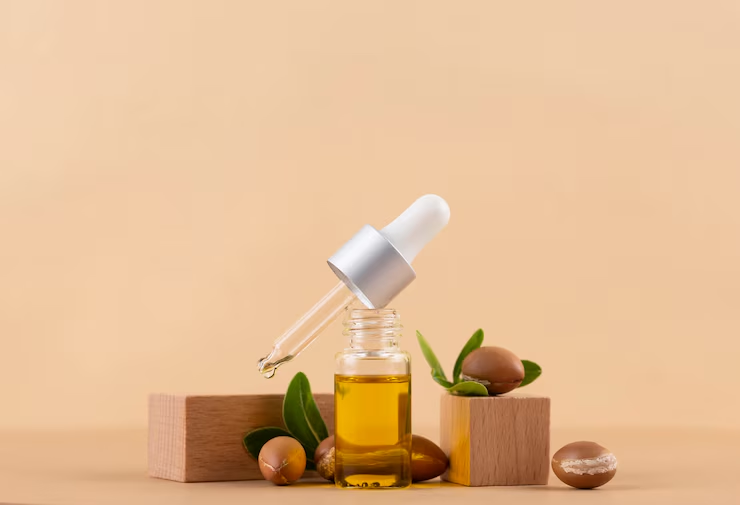Argan oil is more than just a beauty product. It plays a big role in protecting the environment and supporting local communities in Morocco. As demand for natural and sustainable beauty grows, this golden oil offers more than skin-deep benefits.
In this article, we’ll explore the characteristics of argan oil, its advantages, and why choosing it supports both people and the planet.
What Is Argan Oil?
Argan oil is made from the nuts of the argan tree, found mainly in southwestern Morocco. It’s cold-pressed to keep all its nutrients, making it ideal for cosmetic, therapeutic, and culinary use.
Key Characteristics
- Rich in vitamin E, essential fatty acids, and antioxidants
- Cold-pressed and unrefined
- Available in cosmetic, food-grade, and deodorized forms
- Lightweight, non-greasy, and fast-absorbing
- Certified organic and ethically sourced
📘 Read more about the benefits of argan oil – Healthline

How Argan Oil Helps the Environment
Protecting the Argan Forests
The argan forests in Morocco are a UNESCO biosphere reserve. These trees fight desertification and help maintain biodiversity. By buying argan oil, consumers help protect these unique ecosystems.
📘 UNESCO Argan Biosphere Reserve
A Renewable Resource
Unlike synthetic ingredients, argan oil is natural and renewable. It requires minimal processing and grows in dry climates without heavy irrigation, making it an eco-friendly choice.
Supporting Sustainable Farming
Many argan cooperatives use traditional harvesting methods. This helps preserve ancestral knowledge while avoiding the environmental harm linked to mass production.
How It Empowers Local Communities
Women-Led Cooperatives
In Morocco, thousands of women are employed in argan cooperatives. These cooperatives give women stable income, education, and independence, especially in rural areas.
📘 Fair Trade and women’s empowerment – Fair Trade Certified
Education and Social Programs
Some cooperatives invest profits into schools, health clinics, and literacy programs. So, when you buy argan oil, you’re supporting long-term community growth.
Preserving Culture and Tradition
The harvesting and pressing process has been passed down for generations. Buying fair trade argan oil helps keep these traditions alive.

How Argan Oil Compares to Other Oils
| Feature | Argan Oil | Other Natural Oils |
|---|---|---|
| Grown in dry climates | ✅ | ⚠️ |
| Eco-certification | ✅ | Depends on the brand |
| Women cooperative-made | ✅ | Rare |
| Minimal water usage | ✅ | ❌ |
Price Overview
Pricing depends on quality and certification. However, even with a higher price point, the benefits are worth it.
- Cosmetic grade: $45–$60/L
- Deodorized oil: $55–$70/L
- Toasted food-grade: $60–$85/L
- Private label: On request
👉 Discover fair trade bulk argan oil at argan-oil.ma
Real People, Real Impact
“Since working with a cooperative, I’ve gained financial freedom and confidence.” – Amina, Essaouira
“We are able to send our children to school thanks to fair-trade partnerships.” – Fatima, Agadir
“Tourists and customers ask for real, ethical argan oil. We’re proud to share our heritage.” – Zahra, Tiznit
Blogger’s Personal Opinion
As a skincare blogger and someone who values ethical beauty, I believe argan oil is one of the most powerful examples of how a product can do good. Not only does it make your skin glow, but it also helps women gain independence and protects the planet.
Brands like argan-oil.ma work closely with Moroccan cooperatives, ensuring the oil is high-quality and responsibly sourced. When you buy from them, you support beauty that goes beyond the surface.
Conclusion
Argan oil stands out because it does more than nourish skin and hair. It supports women, protects forests, and respects tradition. Choosing fair-trade, certified argan oil is a small act with a big impact.
👉 Interested in sustainable, bulk argan oil? Visit argan-oil.ma to support ethical sourcing and local Moroccan communities.

